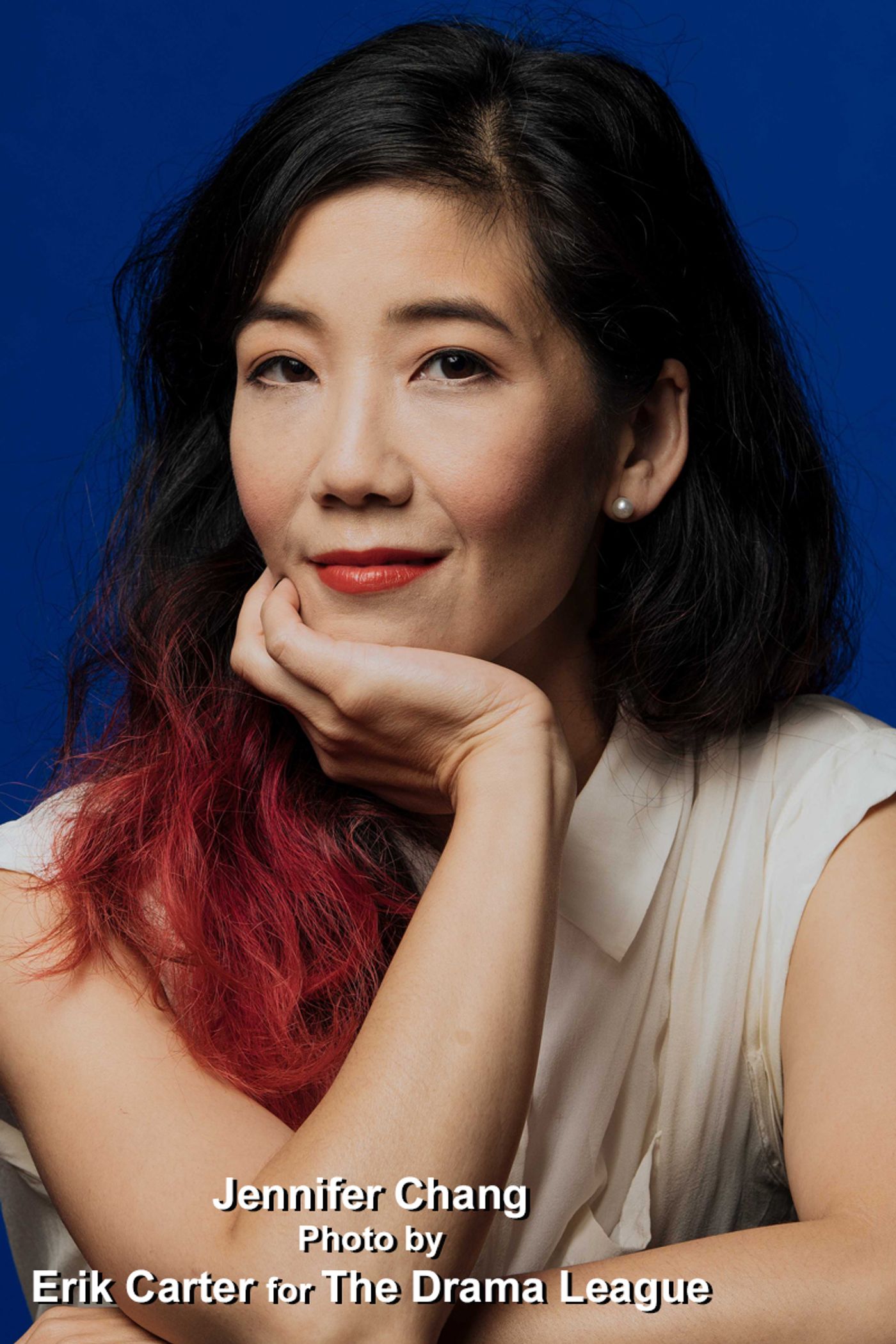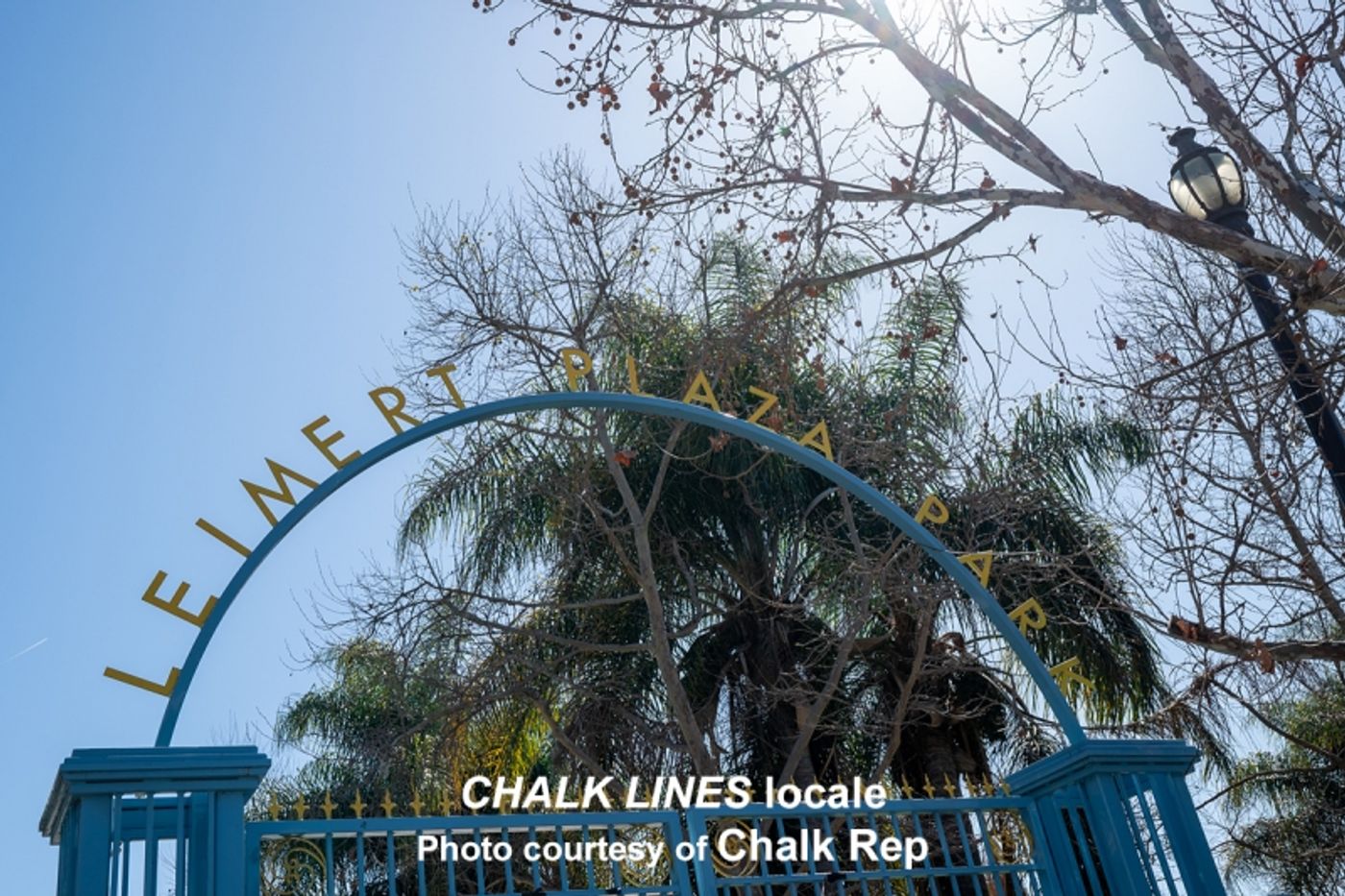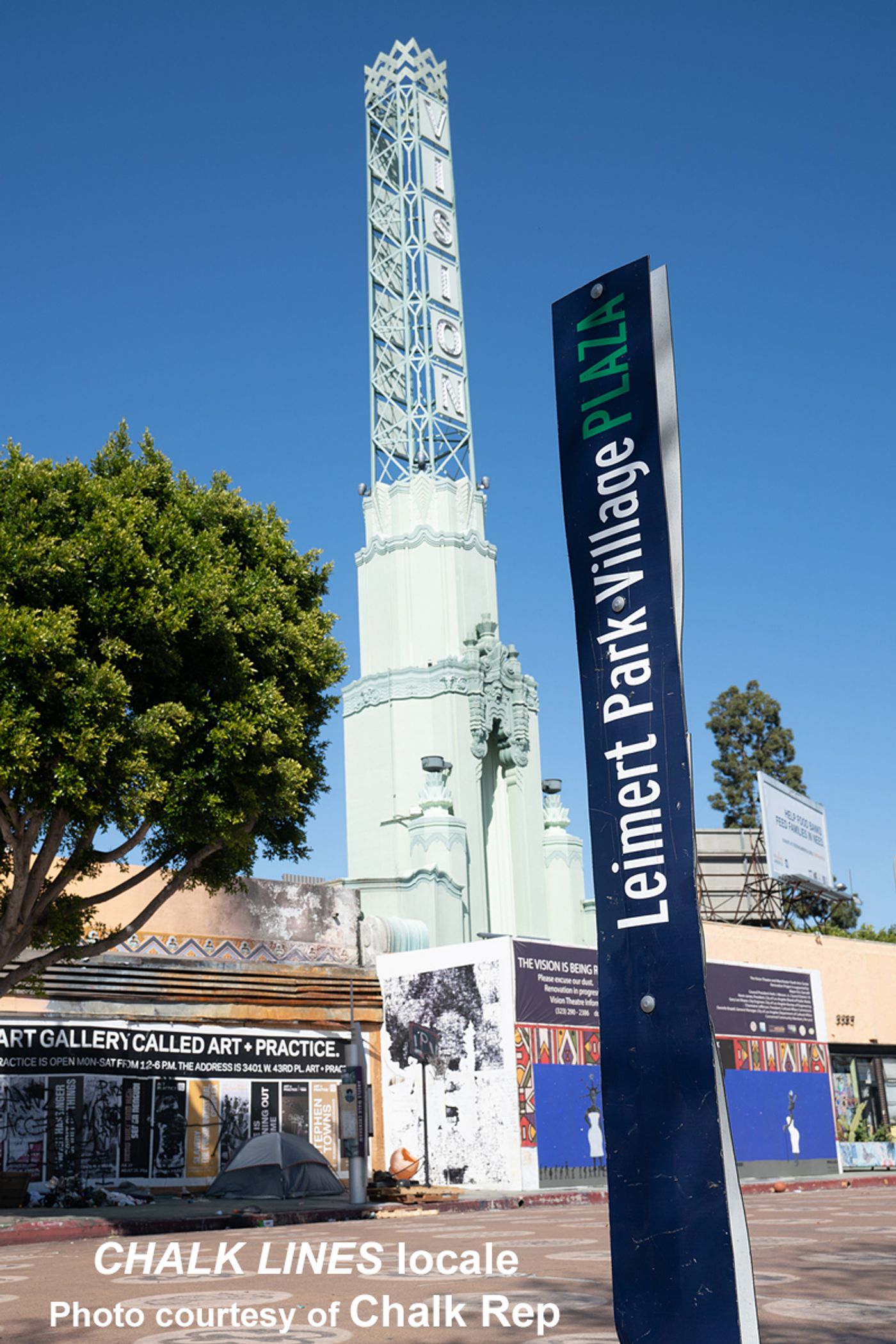Interview: Director Jennifer Chang On Drawing CHALK LINES
Chalk Repertory Theatre launches their new audio play series CHALK LINES June 19, 202

Chalk Repertory Theatre launches their new audio play series CHALK LINES June 19, 2021. The series of five short plays can be accessed for free either to be experienced online or on location at each site with a mobile device. Chalk Rep's artistic producing director Jennifer Chang directs the cast of Xan Churchwell, Gregg Daniel, Tonatiuh Elizarraraz, Veralyn Jones, Emily Kuroda and Emily Stout.
Thank you for taking the time for this interview, Jennifer!
Thank you for having me!
Did the initial form of CHALK LINES morph into this immersive audio play tour? Or was it originally written for this format?
The pieces were always intended to be delivered as audio experiences. Actually pre-pandemic we had been developing and have done trial runs of creating an app, not unlike Pokémon Go, where your location unlocks an 'adventure' - in the case of CHALK LINES, the goal was to unlock an audio play with your geo-location. Simultaneously we received a grant from the Department of Cultural Affairs, with the intention of creating audio stories created about Districts 8, 9, and 10 (roughly between downtown and Culver City) along the Expo line. We wanted to highlight that these districts are destinations and possess rich history and culture and that would be accessible with an adventure on the train. With the pandemic lockdown, obviously we couldn't encourage folks to leave their homes and go to places or ride the expo line - that could potentially put them in contact with other people. We pivoted to focusing on the districts and while we are identifying the locations to where listeners can go and see the real-life locations, we are capturing the sound in an immersive way so that audiences can also experience the journey from their homes. Our sound designers are traveling to the locations in the plays, doing 3D mapping, and capturing the authentic soundscape. We are developing our app for future use.
How did you pick the five playwrights involved - Giovanni Adams, Luis Alfaro, Kimrie Lewis, Joseph Guy Maldonado and Colette Robert?
We wanted our plays to be written by and for the folx who had strong ties to the districts, and we identified talented writers who all were born or lived in the areas. (Colette and Kimrie even went to grade school together!) We wanted to have a variety of experiences and points of view in terms of gender and age and identity within that group of five. We have someone who just recently graduated from school all the way to a veteran award-winning playwright, and multi-hyphenate artists in between.
 Would you describe the production process of CHALK LINES ? Zoom auditions? Zoom rehearsals? Individual recording set-ups?
Would you describe the production process of CHALK LINES ? Zoom auditions? Zoom rehearsals? Individual recording set-ups?
Zoom is grudgingly our best friend. We couldn't collaborate without it - but also it is a constant reminder of our remote-ness. Auditions were done as remote self-recordings. We are operating under a SAG contract and rehearsals are conducted via Zoom and recordings done (under strict COVID compliance and testing, etc.) in studio. We are capturing the performers' audio in a way where they feel free to move and can modulate their volume from a whisper to full yelling as each project needs.
What was the spark that lit the five of you MFA graduates from UC, San Diego to form Chalk Repertory Theatre in 2008?
I bribed my friends with food to start a theatre company with me. This is actually true. But also I had a fortuitous opportunity to meet with Jay Boileau at Hollywood Forever Cemetery and toured a space they had just finished renovating, while I was simultaneously dreaming up an idea to do THREE SISTERS. People had been saying, "Oh yeah, when East West Players does it.... " but 1) that's offensively implying no other actors would be in competition, and 2) that I can only do it when the AAPI community does it. At the time, my thought process was, I know so many talented people who are hanging out between TV and movie jobs, I could populate so many plays with them, I'm dying to do this play and I think I can make a case for demonstrating how equally talented people of color are if I have a play that can both honor the look of a family and populate it with diverse talented actors. So we were doing color-conscious casting before it was even a thing! AND at the same time Larissa Kokernot (a fellow founder) had been working on a remount of a play she had directed in houses, FAMILY PLANNING... so we all just got to work producing and for the purposes of insurance, etc. we formed a company. Necessity truly being the mother of invention.
Was it a no-brainer to establish Chalk Rep in Los Angeles, instead of San Diego?
Yup - we had all relocated to L.A. and we saw an opportunity - focusing on people NOT stuff, especially in the midst of a recession. We thought why not operate like a film production company looking for locations that could attract a non-theatre going audience to be interested in theatrical experiences. It also presented an opportunity to discover and appreciate Los Angeles - a city that doesn't get enough credit for its rich history. Without being tied to any overhead on a space, it could mean we could produce because we really wanted to, not because we had to.
 Directing a site-specific production must present an added layer of to-do's to your production process. What elements are on your "must-have" list?
Directing a site-specific production must present an added layer of to-do's to your production process. What elements are on your "must-have" list?
You and your space partners have to have clear understandings on what can and can't happen in the space - what days and times can you be there, what can you leave, what storage is available, what do you have to take down after each performance. Each space is different.
You need to know the why.... you can't just be producing there because the space is cool. There needs to be a compelling why, even if the space emerged first... what does this space open up in the storytelling? What is the conversation? What is the psychological relationship?
And for me, a question I ask no matter where or what I'm directing is: when does the relationship between the performers and audience begin?
What has been the most challenging site to master, that ended up being your most rewarding?
They are ALL impossible. Every time we do one, there's a point where we say, "Why are we doing this again?" But one of my favorites was LADY WINDERMERE's FAN at the William Andrew Clark Memorial Library. The location invited the trip through the garden, and it was great fun exploring the modern equivalent society types and experimenting with crowd management. Logistical nightmares included the different shape that strike would have every night and weekend (lots of furniture moving), dealing with weather and the location of the sun, actors physicality and vocal projection in terms of an outdoor space, audience comfort and experience, and how to rehearse when a space is in use and needs serenity and peace because it's a library. Even things like how to call actors to places and give everyone a cue to go and monitor the progress of a show which is taken for granted in a theatre is a new problem in every space we are in.
 Which gives you more satisfaction: soaking up an appreciative audience's applause during your curtain call onstage? Or hanging off-stage watching your actors' nail your direction?
Which gives you more satisfaction: soaking up an appreciative audience's applause during your curtain call onstage? Or hanging off-stage watching your actors' nail your direction?
Oh gosh! What a great question! I think what I love about being a director is the same reason why I love to host parties. I love to see people come together and have an experience. And I think my job is to cultivate the conversation happening between the actors and the audience. When that conversation is happening which is actually both things - actors communicating with authentic vulnerability and in sync with the audience - I think that's pure magic.
Of the awards you've amassed so far, what was the most unexpected?
I mean, any award at all is unexpected? I am at heart an actor, (that's where all my formal training is in) so my ego is wrapped up in acting, and I will confess I am quite neurotic and vulnerable! But, I find that as a director or producer - because I never expected anything from this work except to have fun and tell stories - that I have the freedom to really embrace the process and the experience that I am cultivating with the 'family' I am creating with my collaborators. And truly the focus is on the ideas and the conversation we are having with the audience. My manager says, "I know you don't care about these things" and quite honestly I don't. I know that sounds fake or ungrateful, but you can't believe the hype because then you have to believe the criticism and I want to just make work, get better, keep growing. But yeah, as a person of color, as a woman, as a mother, I know what system I am living in, and that you have to list those things so that you can have access and opportunities. So I am truly grateful for the encouragement from the community.
Do you use a parallel mindset in your directing actors and your teaching students?
I'm an avid gardener and I think my approach to directing and teaching is similar. I look at where the plant wants to grow and trim and prune and fertilize to make it the best it can be. My directing and teaching is really bespoke to the individual. Where is the student on their artistic timeline? Where is the actor on their process timeline? What note are they ready for? You can't give all the notes all at once during process or in class. Notes need to be well-timed and in the sequence that the artist is ready to receive them in. Also, I direct a lot of actors from diverse backgrounds, and I will say that I specifically encourage them and all my students to take up the space to which their character is entitled and honor the diva within!
What is the one lesson a mentor taught you that you emphasize to your students today?
 You don't always have to have the answers (but you have to want to find out). Ok and another: know what rule you are breaking.
You don't always have to have the answers (but you have to want to find out). Ok and another: know what rule you are breaking.
Have you been doing anything to celebrate Asian American and Pacific Islander Heritage Month?
Most of my formal celebration revolves around sharing projects that center the AAPI experience: We are re-streaming a project I directed in the Fall for UCSD: EXOTIC DEADLY, OR THE MSG PLAY by Keiko Green as part of AAPI Heritage month at UCSD. The audio play project I directed for Antaeus' ZIP CODE PLAYS is about Monterey Park: BINGO BITCHES by Elizabeth Wong was released on May 20 in time for the month, and the creatives are speaking on a panel for the Monterey Park Library as part of the month's festivities.
Every month is AAPI Heritage month at my house!
What's in the post-pandemic future for Jennifer Chang?
I have a few projects cooking and meetings I've been in - so maybe more news soon! But I can say right now that I am going to spend some time at the New Harmony Project with writer Lina Patel in August and have a sabbatical in the fall for research around decolonizing text analysis, and am directing ON GOLD MOUNTAIN with L.A. Opera at the Huntington Gardens in 2022.
Thank you again, Jennifer! I'm going to have to check back in with you for MOUNTAIN next year, and I look forward to experiencing your CHALK LINES this month.
To stream the audio CHALK LINES for free beginning June 19, 2021; log onto www.chalkrep.com
You can experience the five short plays of CHALK LINES either online at home, or on location at each CHALK LINES site with a mobile device. Donations are encouraged.
Videos

